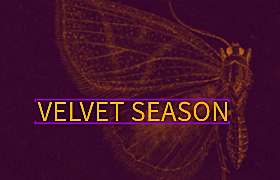Ellie was no longer fascinated with going to school with Eleanor, now 17 and a senior at Melitown High, sitting in the back of Honor’s English and drawing a series of beetles climbing over the lines of her notebook. She doesn’t really understand what the teachers are talking about anymore, and now that the students are older, there’s rarely any entertaining hijinx to watch from the safety invisibility. Eleanor can’t disappear in a waft of fragrance like Ellie, so she might be stuck there for “legal reasons” or whatever, but Ellie isn’t. She is free to do whatever she wants, and she wants to be out in the sun. She wants green. She wants the breeze and the smell of the pollen it carries from who knows where? She could find out. Who could stop her?
Carefully, she takes Eleanor’s pen from her hand and scribbles “time for trees” in the margin of the notebook, unseen by anyone in the room. This was her latest skill—she’d figured out how to stick around after “poofing” instead of just popping up wherever she imagined, and she could touch stuff.
Eleanor stifles a gasp and, remanding control of her favorite ultra-fine point sketcher, writes “later punk” in her more evolved print.
Retaking the pen, Ellie suffixes it with an “-in!” and doodles a squatty circle with a stem and a face with grumpy eyebrows. The classroom that had been smelling like sunflowers and tomato vines now shifts to its usual teenage funk and whiteboard cleaning solution, signaling her departure.
The mountain of dark hair and threadbare plaid flannel next to Eleanor lurches up, revealing the sleepy eyes of Simon Kinu. He looks around and, confused, squints in her direction and inhales. Not only is he her neighbor in class—the Kinus live catty-corner to her Auntie’s apartment. The two of them share every class except for second period, when she has art, while he is getting an easy A in French, as he speaks it at home. He is just always somewhere in her periphery and has been for years.
“Outside,” he says groggily.
“What?” asks the guy in front of him, turning around toward him and seeing him looking at Eleanor.
“Hrm?” Simon returns.
“Oh, were you talking to Lenore?”
“Was I?” Simon blanches. “Did I say something out loud?”
“You said something about outside. I thought you were asking about lunch plans,” the classmate she couldn’t remember the name of shrugged.
Simon frowns, not remembering his waking thoughts at all, and goes with lunch, “Want to go grab something from Goat’s? I didn’t bring anything today.”
“Sorry man, I’ve got practice,” he says, turning back around.
Mr. Desta clears his throat and addresses the restless class, “Since we’re all clearly ready for group work, I will give you these last few minutes to pair up for your next assignment,” to mixed reception. Eleanor raises her hand.
“No, Ms. Kistler, for the last and final time before graduation, you cannot work independently on the group project. That would mean someone else would be forced to work alone and because I said so,” he says, elbows on his desk, raising his hands to tent his fingers.
She puts her hand down and goes back to her beetles. For someone whose name means “joy” she feels his demeanor is too frequently unmerry. (She had looked it up when she got home the first day of class, like she does every new-to-her name or word. Stacks of black and white marble composition books are at home, filled with research topics and her notes on each.) Her thoughts are interrupted by Simon knocking quietly on her desk.
“Pair up again?” he asks, leaning down and tilting sideways to look at her.
“Sure,” she says, resigned to one last collaborative assignment of her high school career. It wasn’t like he was a bad partner; they were the top of the class rankings, and Simon was not a slacker. He switches to the seat in front of her, vacated by the mass pairing around them to the clangor of screeching chair legs on linoleum and handouts being passed around.
“Thanks for having me!” he cheerily brushes aside her lack of enthusiasm.
He is so easygoing and warm, she thinks, pretending to read the printout and imagining what it must be like to be so affable.
She’s so serious and reserved, he thinks, looking at her long lashes hiding her eyes. He knows their colors, the impossible multitudes of greens and golds contained in something smaller than a palm. Her avoidance offers him the opportunity to appreciate her up close. Her eyeliner wings out quite a bit like his older sister’s, and he guesses their lipstick is about the same shade. It just looks different contrasting against her paler coloring. His thoughts drift to his oils at home and how he would achieve it. It’s not creepy if it’s a line of thought you always go down looking at everything, he assures himself. It’s for Art. She would understand, as a fellow artist.
Eleanor flips the sheet over, still mostly comparing herself to Simon. He’s vivacious and well thought of, probably with good cause. He seems genuinely kind. At least she’d never witnessed him being anything but kind.
On the other hand she was known to be cold and cutting. Pushing people away is easier than hiding all of the things about her that she needs to. Which was everything. She couldn’t think of a single thing they had in common, but she figured she’d want them to be like him if she could have friends.
He watches her sigh and run her fingers through her long black hair, returning it to its usual hang out behind her ear. She’s wearing a lot of thin black bracelets and a few with tiny glittering beads, also black, that look a bit like something made by a crafty kid trying to make her a present more than something she’d DIY for herself. Did she babysit? He didn’t know what she did most of the time outside school. It was a little weird that she essentially lived alone. His dads know her aunt since they’d been neighbors for so long, and they were always around in case of an emergency and to help with any repairs while she was traveling for work. It seems like she’s always traveling and hasn’t been around since Lenore moved in after her grandmother passed away. He’d been trying to befriend her since they were seven. Amira said she was probably just shy and to give it time, but it had been ten years, and his sister was the only one who’d gotten a smile and a wave back from across the street.
If only we could be friends, they think unknowingly in unison.












Comments (6)
See all